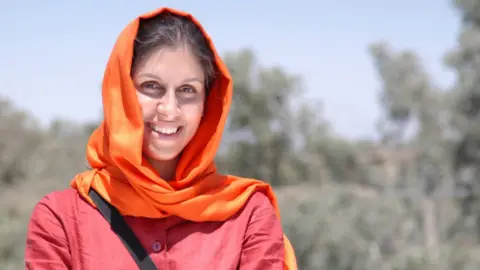Johnson to urge Iran to release Nazanin Zaghari-Ratcliffe
 Nazanin Zaghari-Ratcliffe
Nazanin Zaghari-Ratcliffe Boris Johnson is to call for the release of jailed British-Iranian national Nazanin Zaghari-Ratcliffe when he meets Iran's president later.
The prime minister will meet Hassan Rouhani at a UN summit in New York, hours after blaming Iran for attacks on Saudi Arabian oil facilities.
It comes amid calls for him to take a tougher line with Tehran over its detention of dual nationals.
Mrs Zahgari-Ratcliffe has been detained in Iran since April 2016.
The 40-year-old was jailed for five years in 2016 after being convicted of spying, which she denies.
On his flight to New York on Sunday, Mr Johnson told reporters: "I will not only be discussing Iran's actions in the region, but also the need to release not just Nazanin but others who in our view are being illegally and unfairly held in Tehran."
Former foreign secretary Jeremy Hunt suggested Mr Johnson should form a new coalition of allies at the UN to call out Iran for its "diplomatic hostage taking".
And Mrs Zaghari-Ratcliffe's husband, Richard Ratcliffe, said the prime minister must tell his Iranian counterpart "enough is enough" and secure his wife's release.
"I don't mind how he does that, but this has gone on long enough," he said.
"Nazanin is at the end of her tether. We have to be clear with Iran that it's not OK to conduct hostage diplomacy."
Mr Hunt is supporting Mr Ratcliffe's move to launch a new campaign group made up of other families of different nationalities with loved ones held in Tehran.
He told BBC Radio 4's Today programme it should be a priority to ensure the price of taking hostages is "too high" for Iran.
"Iran is one of the few countries in the world that seeks to settle disputes by taking hostages," he said.
He said it is thought other countries' citizens have been taken hostage in Iran and only by working together can countries find a solution.
"When Europe and the US go separate ways on Iran it doesn't work," he said.
Campaign group
Mr Ratcliffe said efforts by Mr Johnson to get his wife released could make amends for comments he made as foreign secretary in 2017, when he said Mrs Zaghari-Ratcliffe was in Iran teaching journalism.
Mrs Zaghari-Ratcliffe's family has always insisted she was on holiday in Iran when she was arrested - and the UK government later clarified it had "no doubt" this was the case.
A number of people with dual Iranian and foreign nationality have been detained in Iran in recent years.
In August, a spokesman for Iran's judiciary said a British-Iranian dual national, Anousheh Ashouri, had been sentenced to 10 years in prison by a court in Tehran after being convicted of spying for Israel.
British-Australian Kylie Moore-Gilbert, a Middle East politics specialist at Melbourne University, is being held on charges that remain unclear, according to the Australian government.
Australians Mark Firkin and Jolie King, who also holds a UK passport - are also being detained in Iran.
 Jolie King
Jolie KingEarlier this year, the UK foreign office warned all dual nationals against travelling to Iran because of the risk of arbitrary detention.
Tensions between the UK and Iran have worsened in recent months following a row over the seizure of oil tankers in the Gulf.
The meeting between Mr Johnson and Mr Rouhani comes after the UK, France and Germany agreed on Monday that Iran was responsible for the attack on Saudi oil facilities last weekend.
Saudi Arabia has also accused Iran of carrying out the 14 September attacks, in which 18 drones and seven cruise missiles hit an oil field and processing facility.
However, Iran has denied responsibility, accusing the UK, France and Germany of "parroting absurd US claims".
BBC diplomatic correspondent James Landale said slowly and cautiously, some diplomatic pressure was being applied on Iran.
But he added there was little sign Iran was ready to make any diplomatic concessions, not least while Europe and the US appeared uncertain over how to respond to the Saudi attacks.
